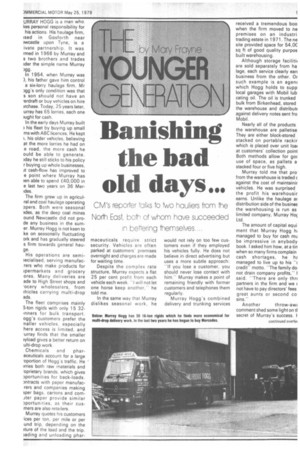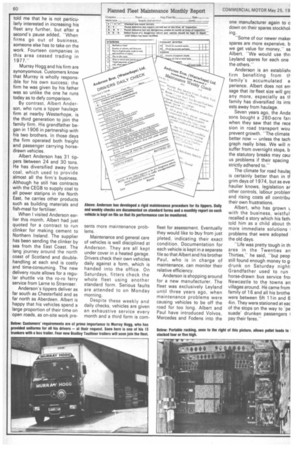Banishin the bad old days...
Page 61

Page 62

If you've noticed an error in this article please click here to report it so we can fix it.
CM's reporter talks to -wo hauliers from the Non East oo--) of whom have succeeded in Petering themselves..„
URRAY HOGG is a man who kes personal responsibility for his actions. His haulage firm, ised in Gosforth near ;In/castle upon Tyne, is a ivate partnership. It was rmed in 1966 by Murray and s two brothers and trades ider the simple name Murray )gg.
In 1954, when Murray was ), his father gave him control a six-lorry haulage firm. Mr )gg's only condition was that s son should not have an rerdraft or buy vehicles on hire irchase. Today, 25 years later, urray has 65 lorries, each one )ught for cash.
In the early days Murray built ) his fleet by buying up small ms with ABC licences. He kept 1, his older vehicles, believing at the more lorries he had on e road, the more cash he ould be able to generate. )day he still sticks to his policy r buying up whole businesses, it cash-flow has improved to e point where Murray has !en able to spend £40,000 in e last two years on 36 Merdes.
The firm grew up in agriculral and coal haulage operating vers. Both were seasonal 3des, as the deep coal mines ound Newcastle did not prode any business in the sumer. Murray Hogg is not keen to ke on seasonally fluctuating ork and has gradually steered
s firm towards general hauge.
His operations are semi)ecialised, serving manufacrers who make products for ipermarkets and grocery ores. Many deliveries are ade to High Street shops and -ocery wholesalers, from hicles carrying multi-drop ads.
The fleet comprises mainly 3-ton rigids with only 15 32 ■ nners for bulk transport. ogg's customers prefer the naller vehicles, especially here access is limited, and urray finds that the smaller iyload gives a better return on ulti-drop work.
Chemicals and pharaceuticals account for a large .oportion of Hogg's traffic. He irries both raw materials and .oprietary brands which gives )portunities for back-loads. )ntracts with paper manufacrers and companies making )per bags, cartons and comJter paper provide similar )portunities, as their cusmers are also retailers.
Murray quotes his customers ices per ton, per mile or per und trip, depending on the iture of the load and the trip. )ading and unloading phar
maceuticals require strict security. Vehicles are often parked at customers' premises overnight and charges are made for waiting time.
Despite the complex rate structure, Murray expects a flat 25 per cent profit from each vehicle each week. -I will not let one horse keep another,'" he told me.
In the same way that Murray dislikes seasonal work, he
would not rely on too few customers even if they employed his vehicles fully. He does not believe in direct advertising but uses a more subtle approach: -If you lose a customer, you should never lose contact with him.Murray makes a point of remaining friendly with former customers and telephones them regularly.
Murray Hogg's combined delivery and trunking services received a tremendous boo when the firm moved to ne premises on an industri trading estate in 1971. The ne site provided space for 54,0C sq ft of good quality purpos built warehousing.
Although storage facilitii are sold separately from ha lage, each service clearly earl business from the other. Or such example is an agen( which Hogg holds to supp local garages with Mobil lub cating oil. The oil is trunked bulk from Birkenhead, stored the warehouse and distribut( against delivery notes sent fro Nearly all of the products the warehouse are palletise They are either block-stored stacked on portable rackir which is placed over unit loal at customers' collection point Both methods allow for goc use of space, as pallets a stacked four or five high.
Murray told me that pro from the warehouse is traded c against the cost of maintainir vehicles. He was surprised the profit his warehousir earns. Unlike the haulage ar distribution side of the busineF. the warehousing is run as limited company, Murray Hoq Ltd.
The amount of capital equi ment that Murray Hogg fl managed to buy for cash mu be impressive in anybody book. I asked him how, at a tin when so many firms complain cash shortages, he 1-1( managed to live up to his creditmotto. -The family do not drain company profits,I said. "There are only thro partners in the firm and we ( not have to pay directors' fees great aunts or second co sins.'"
Another throw-aw( comment shed some light on tl secret of Murray's success. F told me that he is not particularly interested in increasing his fleet any further, but after a second's pause added, When firms go out of business, someone else has to take on the work. Fourteen companies in this area ceased trading in 1977."
Murray Hogg and his firm are synonyomous. Customers know that Murray is wholly responsible for his own success; the firm he was given by his father was so unlike the one he runs today as to defy comparison.
By contrast, Albert Anderson, who runs a tipper haulage firm at nearby Westerhope, is the third generation to join the family firm. His grandfather began in 1906 in partnership with his two brothers. In those days the firm operated both freight and passenger carrying horsedrawn vehicles.
Albert Anderson has 31 tippers between 24 and 30 tons. He has diversified away from coal, which used to provide almost all the firm's business. Although he still has contracts with the CEGB to supply coal to all power statipns in the North East, he carries other products such as building materials and fish-meal for fertiliser.
When I visited Anderson earlier this month, Albert had just quoted for a contract to run clinker for making cement to Northern Ireland. The supplier has been sending the clinker by sea from the East Coast. The long journey around the north coast of Scotland and doublehandling at each end is costly and time-consuming. The new delivery route allows for a regular shuttle via the ro-ro ferry service from Larne to Stranraer.
Anderson's tippers deliver as far south as Chesterfield and as far north as Aberdeen. Albert is happy that his vehicles spend a large proportion of their time on open roads, as on-site work pre sents more maintenance problems.
Maintenance and general care of vehicles is well disciplined at Anderson. They are all kept under cover in a heated garage. Drivers check their own vehicles daily against a form, which is handed into the office. On Saturdays, fitters check the whole fleet using another standard form. Serious faults are attended to on Monday morning.
Despite these weekly and daily checks, vehicles are given an exhaustive service every month and a third form is com fleet for assessment. Eventually they would like to by from just pleted, indicating their exact condition. Documentation for each vehicle is kept in a separate file so that Albert and his brother Paul, who is in charge of maintenance, can monitor their relative efficiency.
Anderson is shopping around for a new manufacturer. The fleet was exclusively Leyland until three years ago, when maintenance problems were causing vehicles to be off the road for too long. Albert and Paul have introduced Volvos, Mercedes and Fodens into the
one manufacturer again to c down on their spares stockhol, ing.
"Some of our newer maker spares are more expensive, b we get value for money," sa Albert. "We would use thri Leyland spares for each one the others."
Anderson is an establish( firm benefiting from th family's accumulated e perience. Albert does not em sage that fleet size will gro any more, especially as tF family has diversified its intt ests away from haulage.
Seven years ago, the Ande sons bought a 260-acre fart when they saw that the rece sion in road transport wou prevent growth. "The climate better now — unless the tach graph really bites. We will n suffer from overnight stops, b the statutory breaks may caul us problems if their spacing strictly adhered to."
The climate for road haula,c is certainly better than in tt grim days of 1974, but as eve haulier knows, legislation ar other controls, labour problerr and rising costs all contribu their own frustrations.
Albert, who has grown L with the business, wistful recalled a story which his fath, told him as a child about th more immediate solutions 1 problems that were adopted the old days.
"Life was pretty tough in th area in the Twenties an Thirties," he said, "but peop still found enough money to g, drunk on Saturday night! Grandfather used to run horse-drawn bus service froi Newcastle to the towns an villages around. He came from family of 16 and all his brothe were between 5ft llin and 6 4in. They were stationed at eac of the stops on the way to 'pe suade' drunken passengers 1 pay their fares."




























































































































